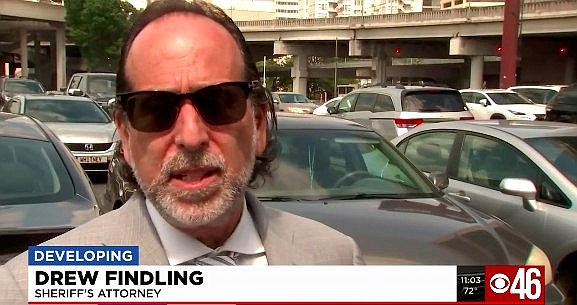Former fed. prosecutor: Fed authorities may have to prove use of restraint chair in jail was punishment
CNN/Stylemagazine.com Newswire | 4/28/2021, 11:01 a.m.
Originally Published: 28 APR 21 10:59 ET
By Ciara Cummings
CLAYTON COUNTY, Georgia (WGCL) -- Clayton County police as well as the Georgia Department of Corrections' policy, only authorize using restraint chairs as a safety measure when an offender is violent or unruly. But at least four times last year, federal investigators claim the sheriff violated those rules and constitutional rights.
Moments after Clayton County Sheriff Victor Hill was released on a $50,000 bond, his attorney stood outside the federal courthouse to call the allegations of misconduct 'disgraceful.'
"We know of all these incidents and let me assure you, our due diligence, our thorough investigation indicated there were no injuries in any of these instances," said Drew Findling.
Federal indictments indicate otherwise, four inmates claim they had bodily harm as a result of Hill strapping them into restraint chairs for several hours in the Clayton County jail in 2020.
CBS46 investigated the impact of the alleged misuse of these types of chairs in other counties-- in other agencies unrelated Hill's case.
Back in 2018, a Polk County inmate claimed he was put in a restraint chair and then repeatedly tased by officers. And in 2010, CBS46 found an inmate died after being tied to the chair for nearly 14 hours.
In a Tuesday press conference, agents said "badges and guns don't come with the authority to ignore the constitution."
As outlined by Clayton County policy, the chairs are to be used in cases of unruly or violent offenders, "never punishment" in accordance with the 14th Amendment.
"That's one issue that's [being] teed up-- that the chair by design, if used too long can create bodily injury," explained Brett Williams.
Williams is a former federal prosecutor within the civil rights division. He argues this case may rest on whether investigators can prove the use of the device was punishment or protection.
Additionally, in his experience, civil rights violations are difficult to pursue. But Williams told CBS46 he believes it is a fair assumption federal agents could likely already have video evidence from within the jail.
It is unclear if Hill will be on the job throughout the case but the sheriff is still allowed to carry his weapon as a sworn peace officer.





